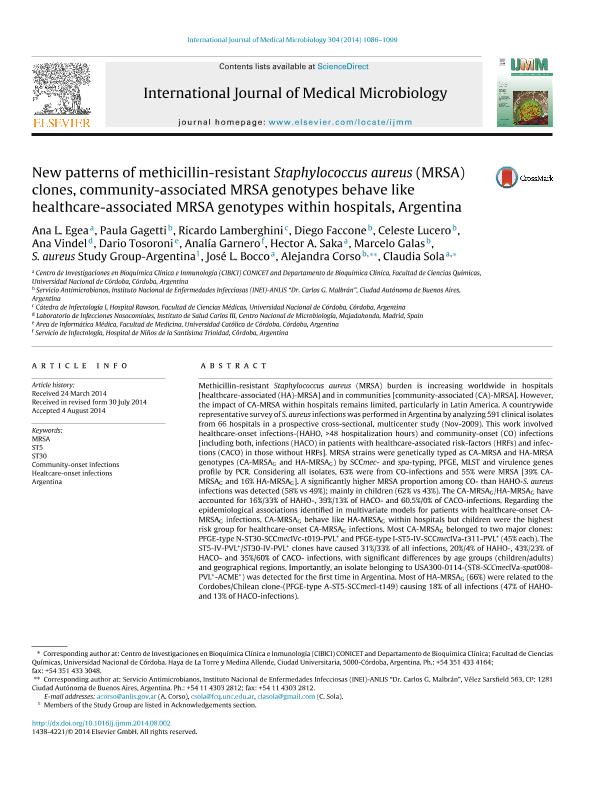Artículo
New patterns of methicillin-resistant Staphylococcus aureus (MRSA) clones, community-associated MRSA genotypes behave like healthcare-associated MRSA genotypes within hospitals, Argentina
Egea, Ana Lía ; Gagetti, Paula Silvana; Lamberghini, Ricardo; Faccone, Diego Francisco
; Gagetti, Paula Silvana; Lamberghini, Ricardo; Faccone, Diego Francisco ; Lucero, Celeste; Vindel, Ana; Tosoroni, Dario; Garnero, Analía; Saka, Hector Alex
; Lucero, Celeste; Vindel, Ana; Tosoroni, Dario; Garnero, Analía; Saka, Hector Alex ; Galas, Marcelo Fabián; Study Group of S. aureus in Argentina; Bocco, Jose Luis
; Galas, Marcelo Fabián; Study Group of S. aureus in Argentina; Bocco, Jose Luis ; Corso, Alejandra; Sola, Claudia del Valle
; Corso, Alejandra; Sola, Claudia del Valle
 ; Gagetti, Paula Silvana; Lamberghini, Ricardo; Faccone, Diego Francisco
; Gagetti, Paula Silvana; Lamberghini, Ricardo; Faccone, Diego Francisco ; Lucero, Celeste; Vindel, Ana; Tosoroni, Dario; Garnero, Analía; Saka, Hector Alex
; Lucero, Celeste; Vindel, Ana; Tosoroni, Dario; Garnero, Analía; Saka, Hector Alex ; Galas, Marcelo Fabián; Study Group of S. aureus in Argentina; Bocco, Jose Luis
; Galas, Marcelo Fabián; Study Group of S. aureus in Argentina; Bocco, Jose Luis ; Corso, Alejandra; Sola, Claudia del Valle
; Corso, Alejandra; Sola, Claudia del Valle
Fecha de publicación:
08/2014
Editorial:
Elsevier Gmbh
Revista:
International Journal of Medical Microbiology (print)
ISSN:
1438-4221
Idioma:
Inglés
Tipo de recurso:
Artículo publicado
Clasificación temática:
Resumen
Methicillin-resistant Staphylococcus aureus (MRSA) burden is increasing worldwide in hospitals [healthcare-associated (HA)-MRSA] and in communities [community-associated (CA)-MRSA]. However, the impact of CA-MRSA within hospitals remains limited, particularly in Latin America. A countrywide representative survey of S. aureus infections was performed in Argentina by analyzing 591 clinical isolates from 66 hospitals in a prospective cross-sectional, multicenter study (Nov-2009). This work involved healthcare-onset infections-(HAHO, >48 hospitalization hours) and community-onset (CO) infections [including both, infections (HACO) in patients with healthcare-associated risk-factors (HRFs) and infections (CACO) in those without HRFs]. MRSA strains were genetically typed as CA-MRSA and HA-MRSA genotypes (CA-MRSAG and HA-MRSAG) by SCCmec- and spa-typing, PFGE, MLST and virulence genes profile by PCR. Considering all isolates, 63% were from CO-infections and 55% were MRSA [39% CA-MRSAG and 16% HA-MRSAG]. A significantly higher MRSA proportion among CO- than HAHO-S. aureus infections was detected (58% vs 49%); mainly in children (62% vs 43%). The CA-MRSAG/HA-MRSAG have accounted for 16%/33% of HAHO-, 39%/13% of HACO- and 60.5%/0% of CACO-infections. Regarding the epidemiological associations identified in multivariate models for patients with healthcare-onset CA-MRSAG infections, CA-MRSAG behave like HA-MRSAG within hospitals but children were the highest risk group for healthcare-onset CA-MRSAG infections. Most CA-MRSAG belonged to two major clones: PFGE-type N-ST30-SCCmecIVc-t019-PVL+ and PFGE-type I-ST5-IV-SCCmecIVa-t311-PVL+ (45% each). The ST5-IV-PVL+/ST30-IV-PVL+ clones have caused 31%/33% of all infections, 20%/4% of HAHO-, 43%/23% of HACO- and 35%/60% of CACO- infections, with significant differences by age groups (children/adults) and geographical regions. Importantly, an isolate belonging to USA300-0114-(ST8-SCCmecIVa-spat008-PVL+-ACME+) was detected for the first time in Argentina. Most of HA-MRSAG (66%) were related to the Cordobes/Chilean clone-(PFGE-type A-ST5-SCCmecI-t149) causing 18% of all infections (47% of HAHO- and 13% of HACO-infections). Results strongly suggest that the CA-MRSA clone ST5-IV-PVL+ has begun to spread within hospitals, replacing the traditional Cordobes/Chilean-HA-MRSA clone ST5-I-PVL−, mainly in children. Importantly, a growing MRSA reservoir in the community was associated with spreading of two CA-MRSA clones: ST5-IV-PVL+, mainly in children with HRFs, and ST30-IV-PVL+ in adults without HRFs. This is the first nationwide study in Argentina providing information about the molecular and clinical epidemiology of CA-MRSA, particularly within hospitals, which is essential for designing effective control measures in this country and worldwide.
Palabras clave:
Mrsa
,
St5
,
St30
,
Community-Onset Infections
,
Health-Care Onset Infections
,
Argentina
Archivos asociados
Licencia
Identificadores
Colecciones
Articulos(CCT - CORDOBA)
Articulos de CTRO.CIENTIFICO TECNOL.CONICET - CORDOBA
Articulos de CTRO.CIENTIFICO TECNOL.CONICET - CORDOBA
Articulos(CIBICI)
Articulos de CENTRO DE INV.EN BIOQUI.CLINICA E INMUNOLOGIA
Articulos de CENTRO DE INV.EN BIOQUI.CLINICA E INMUNOLOGIA
Citación
Egea, Ana Lía; Gagetti, Paula Silvana; Lamberghini, Ricardo; Faccone, Diego Francisco; Lucero, Celeste; et al.; New patterns of methicillin-resistant Staphylococcus aureus (MRSA) clones, community-associated MRSA genotypes behave like healthcare-associated MRSA genotypes within hospitals, Argentina; Elsevier Gmbh; International Journal of Medical Microbiology (print); 304; 8; 8-2014; 1086-1099
Compartir
Altmétricas



